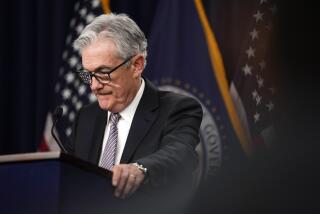China raises interest rates for third time this year to tackle inflation
- Share via
Reporting from Beijing — China raised its benchmark interest rates for the third time this year in a clear move to tackle inflation, which hit a 34-month high in May.
The People’s Bank of China said Wednesday that it hiked the rates 0.25 percentage points each, lifting the benchmark one-year lending rate to 6.56% and the benchmark one-year deposit rate to 3.5%.
The move comes amid speculation that China’s consumer price index, the country’s main gauge of inflation, might have hit a three-year high in June. The government will announce that figure July 15.
Policymakers face a delicate balancing act trying to curb inflation without derailing China’s growth. After a torrent of lending during the global economic crisis, China has been tightening the credit spigot. The amount of capital that banks must now hold in reserve is at record highs.
Already there are some signs that China’s overheated economy could be cooling. An index of manufacturing activity fell to a 28-month low in June. Bankruptcies at small and medium-size companies are said to be rising.
China’s continued growth is crucial at a time when the U.S. and Europe are still struggling with sluggish recoveries. Fears of a coming property bust in China have some analysts worried about a hard landing.
But Mark Williams, an analyst for Capital Economics, said he believed that enough credit would be available in China to avoid a deep slump.
“Higher borrowing costs from banks will make little difference in practice,” Williams wrote in a note to clients. “Benchmark lending rates are still low relative to the pace of economic growth. The constraint on credit growth is the amount that banks can lend rather than the rates they charge.”
Unlike other countries, China sets lending quotas for its banks, a policy tool that often has far greater effect than interest rates.
Inflation in China has been led by rising food prices, the latest being the soaring cost of pork. Pig shortages and higher costs for grain led to a 40.4% year-on-year increase in consumer prices for the meat in May.
Central leaders are said to be sensitive to runaway prices because high inflation could cause social instability.
In an editorial published last month in the Financial Times, Chinese Premier Wen Jiabao even went so far as to say prices would be kept firmly under control this year.
More to Read
Inside the business of entertainment
The Wide Shot brings you news, analysis and insights on everything from streaming wars to production — and what it all means for the future.
You may occasionally receive promotional content from the Los Angeles Times.











